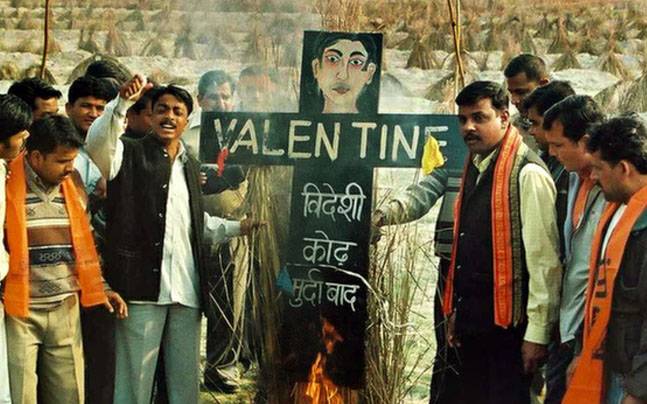The Politics Of Valentine's Day
There is a brand of politics executed by rightist forces on every Valentine's Day. We have seen it in ‘Matr-Pitru Diwas’ hoardings, moral policing and passionate appeals by the RSS-affiliated cultural organisations. Through the politics of asserting the conservative agenda of a few, Valentine's Day is used as a tool of consolidating an ideological position.
That’s one side to the political story of Valentine’s Day. There is, however, another side -- that Valentine's Day in itself is a very political act. It is a construct of one civilisation, i.e Western, and an exercise of tremendous soft-power of the liberal capitalist vision.
Of course, citizens of the West weren’t the first recipients of the ‘love syndrome’, nor are they the practitioners of the only form of love. Other civilisations have had their shares of romantic mythologies, monuments of love, and exotic literature. The continuation of human civilisation is indeed only a product of centuries of ‘making love,’ not unique to any region, civilisation or culture.
Yet, the institutionalisation of love, of manufacturing it into a commercial enterprise happened only in Europe. Like much of the other cultural elements, the Western designation of love triumphed over all other forms. Isn’t it a question worth asking: why did only the Euro-Christian version dominate the universal understanding of love?
Radha and Krishna’s, if taken as a representative of Indian love, also embodies diversity and fluidity. There is not even a marital bond between him and Radha, for they are transcendentally not two but one souls, and their purest love involves no carnal lust. Krishna had so many gopis or modern-day equivalent girlfriends. He participates in multiple relationships in varying forms of love, without being caged into any.
In the West, the human form of love -- which was unorganised and based on personal beliefs and interpretations -- now came to be seen as a business opportunity. Its exploitation began through the corporate media channels where there was a prorogation of ‘perfect-love’ -- where a masculine power-figure would propound his emotions by buying consumer goods for a blushing, feeble miss who understood only a material expression of love. The patriarchal power imbalance was skilfully employed to increase consumption expenditure.
Participation in sexist Indian rituals is seen as strengthening an obsolete traditional order, but an equally patriarchal ritual of Western civilisation which reduces love to a superficiality is welcomed. Is it not less than another form of cultural oppression, where the indigenous imagination is corrupted with glossy goods and hollow campaigns? And it is not one day that needs scrutiny but the whole understanding of an Archies-generation of love -- a very systematic homogenising effort to make us all feel in the same way.
This politics involves a commercial agenda, the target of which is our heart and mind. The outsourcing of thoughts and import of the Western model in all realms is at the genesis of this moral crisis.
That said, it is deeply ironical that those protesting against Valentine's Day -- the self-appointed culture ambassadors of the right -- are themselves most closely affiliated with groups that strongly advance the Western-model of development. They preach cultural nationalism while accepting the western narrative of what happiness and growth must look like. They even believe consumption-driven economic growth is the solution to all economic woes, but don’t accept the material-expression of love that Valentine’s Day has become synonymous with.
But let us not forget, culture is not a static stock of values and traditions. It is hybrid and evolving. While we embrace Valentine’s Day, let us be careful of the more powerful connotations it carries and be critical of accepting it in the form licensed by marketing agencies. Equally, we should honour and respect those who differ from our acceptance of this form of love. For anybody, our idea of love shouldn’t be an imposed one. Acceptance, after all, is the date of love.
(Akshat Tyagi is the 15 year old author of "Naked Emperor of Education" -- India's first young critical commentary of the schooling model. He can be traced at akshattyagi.com)





